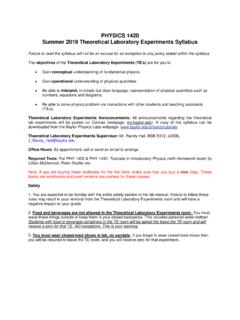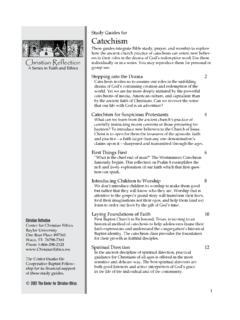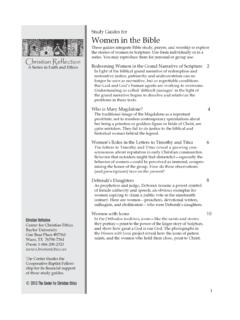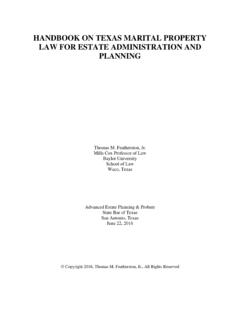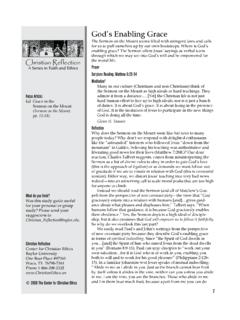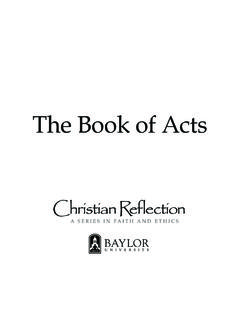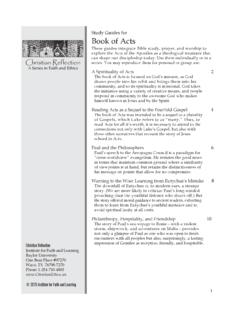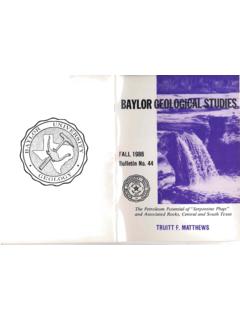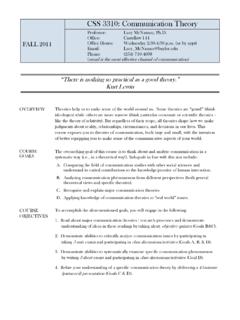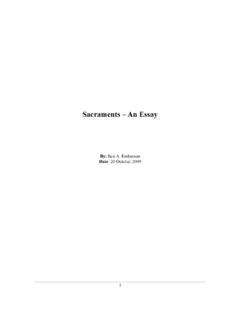Transcription of The Stewardship of Creation - Baylor University
1 Copyright 2002 The Center for Christian Ethics at Baylor University 17 The Stewardship of CreationBY RUSSELL A. BUTKUSV iewed through the lens of Scripture, the environmentalcrisis is best understood as Creation -in-crisis, whichelevates the significance of our situation to the veryheart of God. We are called to have dominion over theearth; this does not mean to exploit, but to exercisecare and responsibility for God s domain particularly inthe interest of those who are poor and earth and its natural systems are in serious jeopardy. Ecologistsand other environmental scientists indicate that the earth s eco-sphere, the parts of it where creatures can live, is at risk from:! The reality of global warming and the very real specter of global cli-mate change and its consequences for disrupting natural and socialsystems;! Continued deterioration of stratospheric ozone and its resulting im-pact on human and planetary health;!
2 Deforestation, particularly of tropical rain forests, and the conse-quential collapse of biodiversity;! Pollution of earth s systems (land, water, and air) through the cre-ation of toxic, nuclear, and hazardous waste with the resultingaccumulation of these in living organisms;! Burgeoning human population growth, currently at billion andpossibly headed toward a cap of around 10 billion by 2050;! Continuing depletion of natural resources through over-harvestingand over-consumption;18 The Moral Landscape of Creation ! The continued global disparity and maldistribution of socio-eco-nomic goods and environmental crisis is self-evident to anyone who is willing toengage the overwhelming scientific evidence. But what should we asChristians make of this scenario? Environmental degradation resultingfrom our activities is one of the major signs of the times (Matthew 16:3)that requires Christians to take stock and respond.
3 Further, this crisis,which from a scientific view is a crisis of nature, is an opportunity for uswhose lives are shaped by biblical faith to rediscover nature as environmental crisis moves us to affirm the theology of Creation resi-dent in the biblical tradition. This theology reminds us that creationcontinues to unfold and therefore God s self-disclosure in Creation contin-ues as well. The divine self-disclosure is available to us just as it was to theancient sages and poets of Israel s wisdom- Creation hymns found in thePsalms and the Wisdom literature of the Old Testament. We, too, have thecapacity to be awe-inspired and marvel at the beauty and sublimity of cre-ation. The environmental crisis raises a third observation. When viewedand interpreted through the lenses of biblical Creation theology, perhapsthe ecological crisis is best understood as Creation -in-crisis, which elevatesthe significance of our current situation to the very heart of for a moment the scope and range of the crisis.
4 It is globaland universal. There is not a species, ecosystem, or human society on theplanet that is unaffected; the entire ecosphere of the earth is , it is a crisis of geologic history, for we are witnessing a collapseof biodiversity the likes of which the planet has not experienced in the last65 million years. By some estimates this process of extinction related to hu-man activities may result in the loss of 27,000 species a ecological crisis is also a crisis of human history and society. Weare shockingly aware that our whole consumer-driven manner of livingupon the earth is unsustainable. We are forced to re-evaluate the social,political, and economic institutions that in large measure have caused thiscrisis. In other words, the dominant paradigms of human existence towhich modernity gave birth are in the process of being good news is that within this milieu of crisis, Christians have re-sponded.
5 Many denominations have issued policy statements, declarations,resolutions, and pastoral letters to provide a theological foundation forChristian ethical response. Central to these writings is the idea that Godhas appointed us to be caretakers and stewards of Creation . For examplethe American Baptist Policy Statement on Ecology (1989) states, Our respon-sibility as stewards is one of the most basic relationships we have withGod. It implies a great degree of caring for God s Creation and all God screatures. 2 More recently the Catholic Bishops in the northwestern , Stewardship is the traditional expression of the role of people in The Stewardship of Creation19relation to Creation . Stewards, as caretakers for the things of God, arecalled to use wisely and distribute justly the goods of God s earth to meetthe needs of God s children. 3 These and similar statements indicate thatthe Stewardship of Creation is a necessary and adequate foundation for aChristian environmental ethic.
6 From this foundation we can then engage inconversation with the natural sciences, philosophical ethics, and the emerg-ing discussions on the meaning of sustainability. What are the contours ofstewardship within the biblical tradition, and how do they shed light onour work ahead as we grapple with the ecological crisis?THE Stewardship OF Creation IN BIBLICAL CONTEXTOur notion of Stewardship comes from biblical Creation theology, dis-tributed throughout the Bible but most visible in Genesis, the Psalms, andthe Wisdom literature of ancient Israel. This body of theology, as it re-ceives renewed attention by biblical scholars, has important implicationsin our attempt to interpret and respond to the environmental crisis. Therecovery of Creation as the horizon of biblical theology encourages us tocontribute to the resolution of the ecological crisis, writes Old Testamentscholar Walter Brueggemann.
7 New investigations in Creation faith andits complement, wisdom theology, suggest that the environment is to beunderstood as a delicate, fragile system of interrelated parts that is main-tained and enhanced by the recognition of limits and givens and by thejudicious exercise of choices. 4 Here are the salient features of biblical Creation theology:! The entire created order has its origins in the sovereign, creative andsustaining power ofGod. In other words, Creation is centeredon God, or it istheocentric.! Creation is not a sin-gular event; it is anon-going process re-quiring the continualsustaining power andpresence of God.! Central to the biblicalnotion of Creation isthe idea of order. God creates order out of primordial chaos. Thisorder is moral as well as physical; it requires ethical behavior tomaintain the harmonious working of Creation .
8 ! Creation , as heaven and earth, is a relational entity, a harmoniouswhole in which creatures fulfill their appointed places and functionsGod is the primary author of the meaningand value of Creation . It s inherent goodnessand beauty is a consistent theme in ancientIsrael s theology of Creation . Moreover cre-ation discloses both the nature of God andthe human vocation within God s The Moral Landscape of Creationwithin a grand design.! As the Creator, God is the primary author of the meaning and valueof Creation . The inherent goodness and beauty of Creation is a consis-tent theme in ancient Israel s theology of Creation .! God is transcendent yet also immanently present within , Creation discloses both the nature of God and the humanvocation within God s the terrain of this theology, Stewardship points to the purpose androle of humanity in Creation . A beautiful example of this is in Psalm 8, ahymn of praise that links God s self-disclosure in Creation with our voca-tion.
9 Why do human beings exist, and what is our role? The psalmistanswers by appealing to the royal model of Stewardship (8:5-8).The Bible contains twenty-six explicit references to the steward orstewardship. In the Old Testament the term is used in a technical fashionto denote a specific office or a vocation in society. According to DouglasHall, the steward is one who has been given the responsibility for themanagement and service of something belonging to another, and his officepresupposes a particular kind of trust on the part of the owner or master. 5 The term became linked with Israel s king, who ruled the chosen people asGod s steward and so was accountable to God. This royal interpretation ofstewardship helps us to understand the first chapter of biblical text that most shapes and perhaps clouds our interpreta-tion of Stewardship is the controversial and widely misunderstood Genesis1:26-28.
10 This passage, part of the account of Creation that scholars attributeto Israel s priests, must be read against the backdrop of ancient Israel s at-titude toward kingship. It says that humans, created in the image (selem)and likeness (demut) of God, are to subdue (kabash) and have dominion(radah) over the earth. Two brief remarks are in order. First, image and likeness are used in a technical fashion here to refer to a statue or someother physical representation of themselves that monarchs erect to remindtheir subjects of who is in power. Genesis 1:26-28 says that human beingsare living reminders of the Creator who is the King of the universe. As Eu-gene March insists, this means that human beings have been given theresponsibility of representing God in the midst of God s Creation . 6 Dominion, from the Hebrew radah, meaning to tread down, also re-quires a brief comment.
